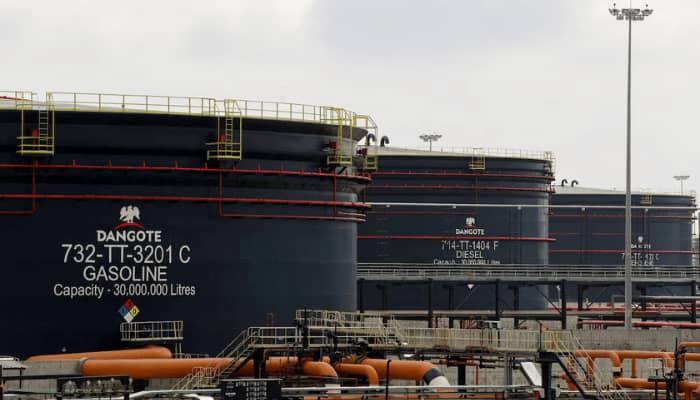Europe to Africa: How Dangote is reshaping the refining landscape
Teekay Adams
Adeleke reporters
February 13, 2025
Dangote Refinery slashes diesel prices to N1,020 per litre, offering relief to industries
In a groundbreaking move, Dangote Petroleum Refinery has reduced the price of diesel by N55 per litre, sending shockwaves through Nigeria’s downstream petroleum sector. This decision has not only disrupted the operations of diesel importers but also challenged Europe’s longstanding dominance in supplying refined petroleum products to Africa’s largest oil producer. The price cut has been widely celebrated as a transformative development for Nigeria’s economy, forcing traditional importers to rethink their strategies in the face of a rapidly evolving market.
Since commencing diesel production in January 2024, the Dangote Refinery—Africa’s largest oil refinery, situated in the Lekki Free Zone near Lagos—has lowered diesel prices multiple times, from an initial N1,700 per litre to the current rate of N1,020. This consistent reduction has provided significant relief to manufacturers and consumers alike. On Monday, the refinery announced a further decrease in the ex-depot price of diesel from N595 to N540 per litre, attributing the move to enhanced production efficiency and the ability to source crude oil locally.
A major setback for diesel importers
The price reduction has dealt a severe blow to diesel importers, many of whom have relied on the lucrative diesel market for years. With Dangote Refinery offering diesel at significantly lower prices, importers are struggling to remain competitive. The higher costs associated with shipping, foreign exchange fluctuations, and international market prices have put importers at a distinct disadvantage.
Industry experts predict that this price cut could trigger a major shake-up in the sector, with smaller importers particularly vulnerable. Tunde Ojo, an independent oil marketer affiliated with the Independent Petroleum Marketers Association of Nigeria, described the development as a “game-changer.” He noted, “Importers who cannot match Dangote’s prices will either have to exit the market or find new ways to stay afloat. The era of relying solely on diesel imports is coming to an end.”
Importers are now faced with tough decisions. Some may attempt to negotiate better deals with international suppliers, while others may explore alternative markets or diversify their product offerings. However, these strategies may not be sufficient to counter the impact of Dangote’s pricing power. Chidi Nwankwo, a petroleum industry consultant, emphasized the challenges importers face: “Dangote’s refinery has a significant cost advantage. Importers will need to rethink their business models to survive, potentially shifting their focus to other products or forming partnerships with local refiners.”
Challenging Europe’s dominance in Africa’s refining market
For decades, Europe has been a key supplier of refined petroleum products to Africa, with countries like the Netherlands, Belgium, and France dominating the market. However, the emergence of the Dangote Refinery is disrupting this long-standing dynamic. By producing refined products locally, the refinery is eroding Europe’s market share. Strategically located in Lagos, a major port city, the Dangote Refinery is well-positioned to serve not only Nigeria but also other African nations, with the potential to export to global markets.
This shift is forcing European refiners to reassess their strategies as they face increasing competition from an African powerhouse. Industry analysts predict that the Dangote Refinery could reduce Africa’s reliance on European imports by up to 50% in the coming years. This disruption extends beyond economics, carrying significant geopolitical implications. As Africa moves toward greater energy self-sufficiency, it gains enhanced leverage in global trade negotiations and reduces its vulnerability to external shocks.
According to OPEC, the Dangote Refinery has already reduced Nigeria’s imports of petroleum products from Europe. Experts suggest that the refinery could bring an end to the decades-long gasoline trade from Europe to Africa, which is valued at $17 billion annually. An OPEC report stated, “The ongoing operational ramp-up efforts at Nigeria’s new Dangote refinery and its gasoline exports to the international market will likely weigh further on the European gasoline market.” The report added, “Continued gasoline production in Nigeria, a country that has historically relied heavily on imports to meet its domestic fuel needs, will likely free up gasoline volumes in international markets, necessitating new destinations and flowu adjustments for the additional volumes.”
Full production capacity on the horizon
The Dangote Petroleum Refinery, Africa’s largest, is poised to reach its full production capacity of 650,000 barrels per day (bpd) within the next 30 days. Edwin Devakumar, vice president of the Dangote Refinery, confirmed that the facility is currently operating at 85% capacity and is on track to achieve 100% capacity soon. The refinery began producing diesel, naphtha, and jet fuel in January 2024, with petrol production commencing in September of the same year.
As the refinery continues to ramp up production, Nigerians can expect further reductions in petroleum product prices. The ongoing price war between Dangote and European producers is likely to intensify, with Dangote maintaining a competitive edge due to its ability to source crude oil in local currency. This advantage ensures that Dangote can continue to lower prices, compelling European producers to reduce their prices to remain competitive in the African market.
In conclusion, the Dangote Refinery is not only transforming Nigeria’s energy landscape but also reshaping Africa’s position in the global petroleum market. As the refinery reaches full capacity, the continent is poised to become more self-reliant, marking a new era of energy independence and economic resilience.



